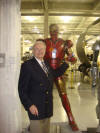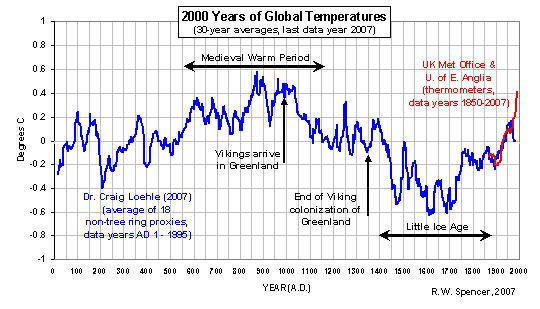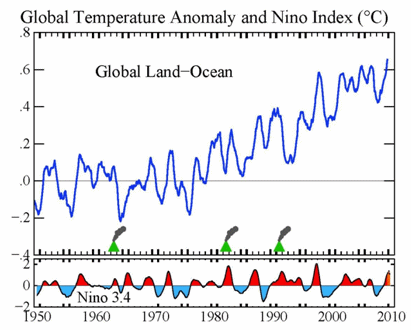| Monday,
October 11, 2010
Columbus Day
I can recall when the Columbus Day Parades were big deals. And I
memorized this in fifth grade. Do pupils memorize poetry and recite in class
now? I hated it at first, but when I found I was good at it I became
more fond of it.
Columbus
by Joaquin Miller
BEHIND him lay the gray Azores,
Behind the Gates of Hercules;
Before him not the ghost of shores,
Before him only shoreless seas.
The good mate said: “Now must we pray,
For lo! the very stars are gone.
Brave Admiral, speak, what shall I say?”
“Why, say, ‘Sail on! sail on! and on!’”
“My men grow mutinous day by day;
My men grow ghastly wan and weak.”
The stout mate thought of home; a spray
Of salt wave washed his swarthy cheek.
“What shall I say, brave Admiral, say,
If we sight naught but seas at dawn?”
“Why, you shall say at break of day,
‘Sail on! sail on! sail on! and on!’”
They sailed and sailed, as winds might blow,
Until at last the blanched mate said:
“Why, now not even God would know
Should I and all my men fall dead.
These very winds forget their way,
For God from these dread seas is gone.
Now speak, brave Admiral, speak and say”—
He said: “Sail on! sail on! and on!”
They sailed. They sailed. Then spake the mate:
“This mad sea shows his teeth to-night.
He curls his lip, he lies in wait,
With lifted teeth, as if to bite!
Brave Admiral, say but one good word:
What shall we do when hope is gone?”
The words leapt like a leaping sword:
“Sail on! sail on! sail on! and on!”
Then, pale and worn, he kept his deck,
And peered through darkness. Ah, that night
Of all dark nights! And then a speck—
A light! A light! A light! A light!
It grew, a starlit flag unfurled!
It grew to be Time’s burst of dawn.
He gained a world; he gave that world
Its grandest lesson: “On! sail on!”
The Discovery of the New World was an epochal event, of course. The flood
of new resources created a middle class, overwhelmed the bureaucracy, and
allowed freedom to grow in among the interstices of the great spheres of
monarchy and aristocracy. The usual course of history is an increase in
structure, generally in accord with the Iron
Law; but once in a while there is enough shock to the system to allow
some resets. This one was crucial to the growth of freedom.
I understand that Columbus brought the conquistadors, and then ended such
old cultures as the Aztecs whose theme song was "Open up your heart and let
the sunshine in." That story is far more complex than the tales of dare and
do that were taught in our grade school history classes; it is also far more
complex than the modernized versions of brutal conquest and exploitation
that now pass for history. Few seem to wonder why a few hundred
Conquistadores could overthrow vast empires whose subjects had submitted to
a state devoted to human conquest. Cortez mounted that pyramid and
cast down the execution blocks. He was hated by the rulers and the Aztec
leaders, but his tiny army was victorious, and that wasn't simply because of
the harquebus. But that is another story for another time.
Alas the theme for the day is tyranny.
The Rise of Tyranny
Today's Wall Street Journal has a number of news and opinion items
indicating that if we are approaching the end of history, it is not an end
that we will enjoy.
Begin with "In Holland, Free Speech on Trial" by Ayaan Hirsi Ali.
http://online.wsj.com/article/SB1000142
4052748704657304575539872944767984.html
Imagine if a leader within the tea party movement
were able to persuade its members to establish a third political party.
Imagine he succeeded—overwhelmingly—and that as their leader he stood a
real chance of winning the presidency. Then imagine that in anticipation
of his electoral victory, the Democrats and Republicans quickly modified
an existing antidiscrimination law so that he could be convicted for
statements he made on the campaign trail.
All of this seems impossible in a 21st-century
liberal democracy. But it is exactly what is happening in Holland to Dutch
parliamentarian Geert Wilders.
Wilders is on trial and will probably be convicted. The penalty is one or
more years in prison. The charge is insulting a group on the basis of race
or religion. This is liberalism in action: and the tyrants here are not a
king (or queen) but a faceless bureaucracy who are only doing their job.
Wilders is certainly guilty:
No one has ever accused Mr. Wilders of being
diplomatic. He's famously compared the Quran to "Mein Kampf" and described
it as a "fascist book," he's called Muhammad "the devil," and he's proposed
policies—such as banning the construction of mosques and taxing women who
wear the burqa—to halt further Islamification.
Of course there are plenty of people in the USA who have said things just
as "insulting" to various groups. Blacks feel insulted by Charles Murray's
findings in The Bell Curve, and there are those who have said he ought to be
jailed for having said them. Demonstrating the truth of the book's
conclusions is no defense of course. Insult is in the mind of the insulted.
I can imagine scenarios in which this becomes a Federal Law, and thus "The
Supreme Law of the Land." It's happening elsewhere in Europe, too. Of
course one argument for socialism is that we need to catch up with Europe
and get into the third millennium.
Then there is Shutting Up Business: Democrats unleash
the IRS and Justice on donors to their political opponents, (link)
an editorial in the same issue.
Then there's the curious reference to the tax
status of Koch Industries by White House chief economist Austan Goolsbee.
In a late August conference call with reporters, Mr. Goolsbee cited the
closely-held Koch as an example of "really giant firms" that pay no
corporate income tax because they file under other tax rules. But how in
the world would Mr. Goolsbee know Koch's tax status? Could his knowledge
be related to the White House-liberal campaign against Koch for
contributing to Americans for Prosperity, a group that is supporting
free-market candidates for Congress this year?
In an August 9 speech, Mr. Obama personally
trashed Americans for Prosperity, hinting that it was funded by "a big oil
company." He had to mean Koch, which makes no secret of its support for
Americans for Prosperity.
The White House didn't respond to queries
about Mr. Goolsbee's remark for weeks until GOP Senators requested an
investigation. The Treasury's inspector general for tax matters has since
announced such a probe, and last week White House spokesman Robert Gibbs
finally got around to explaining that Mr. Goolsbee's statement "was not in
any way based on any review of tax filings" and that he won't use the
example again.
We're glad to hear it, but pardon our
skepticism given the ferocity of this White House-led campaign against
businesses that donate to political campaigns. Faced with electoral
repudiation as the public turns against their agenda, Democrats are
unleashing government power to silence their political opponents. Instead
of piling on, the press corps ought to blow the whistle on this attempt to
stifle political speech. This is one more liberal abuse of power that
voters should consider as they head to the polls.
I don't suppose anyone is really surprised. The Democrats face defeat at
the polls -- assuming that those who have had enough actually go vote and
get out and see that their friends go vote, because this election is about
the ground game, and the Democrats have enormous paid resources for their
team. Democrat strategists relied on the ground game, but now the polls are
showing that will not be enough. Too few jobs, too much spending, too much
uncertainty to generate an economic revival. Thus desperation.
And finally on the tyranny theme:
"Shootout at the EPA Corral" (link)
If Democrats take a drubbing in November, the
Obama Administration is likely to turn to regulation to achieve its
"transformational" agenda. Which is all the more reason to cheer on Texas
as it pushes back against the EPA's illegal attempt to rewrite the
nation's clean air laws.
To wit, the Lone Star State is resisting the
Environmental Protection Agency's decision to regulate carbon under the
clean air laws of the 1970s. These regulations will be damaging enough on
their own. But the EPA and chief Lisa Jackson are also threatening to
punish Texas and other green dissenters with a de facto moratorium on any
major energy or construction projects. Just what the economy needs.
This is being done by executive order, not by laws. It may
be, as the Journal says, "time for the courts"; but one wonders if actions
like this won't make it time for something more drastic.
Under the Clear Air Act, the EPA's national
office chooses priorities, but state regulators run the relevant programs
and issue the necessary permits. When orders from HQ change, as with
carbon over the last year, states get three years to revise their
"implementation plans." But in August, Ms. Jackson decided that the law
posed too long a climate wait and decreed that if these plans aren't
updated by an arbitrary January 2011 deadline, her office will override
the states and run the carbon permitting process itself.
Put bluntly, this coercion is illegal. As
badly as Ms. Jackson has abused clean air laws to go after CO2, she can't
by regulatory fiat usurp the law's statutory language about the federalist
balance of power between Washington and the states. Texas filed an unusual
lawsuit last week with the D.C. appeals circuit calling it an "ultra vires"
act—literally, "beyond the powers"—and requesting an emergency stay of the
EPA's regulations because of the imminence of irreparable harm.
And we daily hear of plans to use the Lame Duck session
after November to ram through a number of liberal measures which Obama can
sign before the new Congress sits in January.
Incidentally, that makes the Delaware Senate race even more
critical: since this is a race to replace the Senator appointed to the job
after Biden departed to become Vice President, the new Senator will take
office immediately after the election is certified, and won't have to wait
until January. I don't care if O'Donnell is a witch: I am sure she won't
vote to end debate on the slew of bills the liberals have queued up for the
days after the election. O'Donnell can stop all that in its tracks. And she
only gets the rest of Biden's term...
===================
I put up a mixed bag of mail
much of it interesting, such as the
geoengineering
pointer. and a continuation of the debate
on measurements and global warming models over the weekend. As well as
some good stuff Saturday. Ought to be
enough for the day.
I intend to do an essay about computer trades and black
swans, but I am out of time. Tonight I am one of those speaking at a fund
raiser for Dana Rohrabacher, an old friend from long ago who is likely to be
Chairman of the Science Committee if the House elections go as many
hope. Hosting the reception is Elon Musk and it will take place at Space X
rocket factory.
=================
Solar warming
http://www.nature.com/news/2010/101006/full/news.2010.519.html
Declining solar activity linked to recent warming
The Sun may have caused as much warming as carbon
dioxide over three years.
The surprise is that there's more visible solar radiation --
the Sun is brighter -- with less solar activity. There seems no explanation.
This seems contrary to what we infer from the Maunder Minimum.
Contrary to expectations, the net amount
of solar energy reaching Earth's troposphere — the lowest part of the
atmosphere — seems to have been larger in 2007 than in 2004, despite the
decline in solar activity over that period.
-- snip --
The full implications of the discovery
are unclear. Haigh says that the current solar cycle could be different from
previous cycles, for unknown reasons. But it is also possible that the
effects of solar variability on atmospheric temperatures and ozone are
substantially different from what has previously been assumed.
I invite comments. My conclusions remain about the same: we
don't rally understand what we think we are modeling, and we need more
observational data. Lots more. If you assume you already know the
cause of something, you don't work as hard to collect the data.
===============
Dame Joan Sutherland, RIP
Biography
A great voice. Perhaps she now sings duets with Caruso.
==================
Midnight. Back from the old Northrop Grumman plant in
Hawthorne where Space-X is building rocket ships. Spoke at a fund raising
dinner for Dana Rohrabacher. The dinner was catered by Wolfgang Puck and his
charming wife. Both were there to be thanked. And Elon Musk may be the Delos
D. Harriman of real life. Anyway it went well. Report with pictures
coming up. Time for bed.
For platinum subscription:
Platinum subscribers enable me to work on what I think is important
without worrying about economics. My thanks to all of you.
Patron Subscription:
Did you subscribe and never hear from me?
Click here!.


Monday TOP
Current Mail |



![]()




